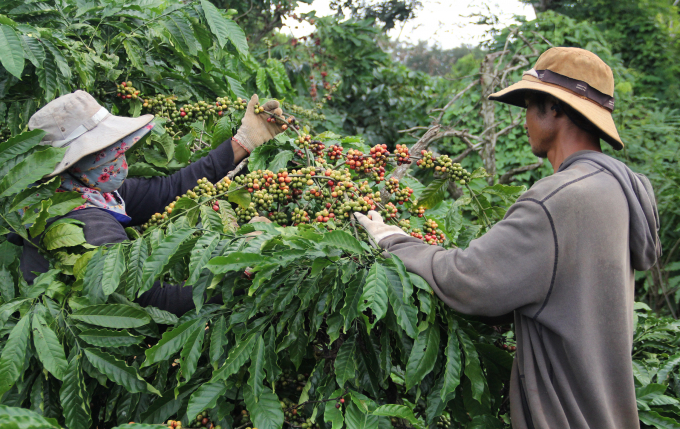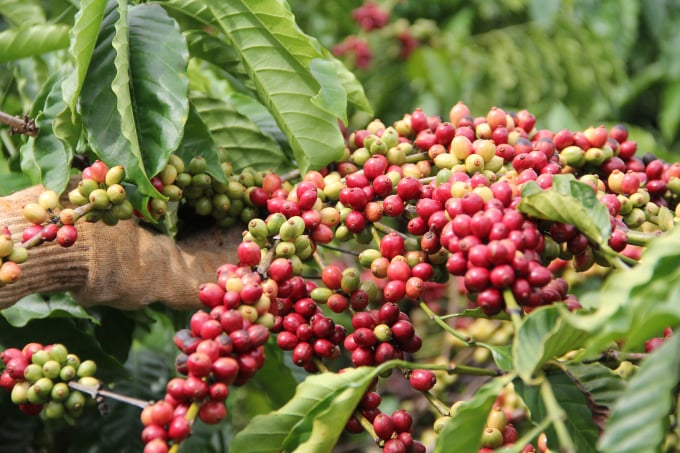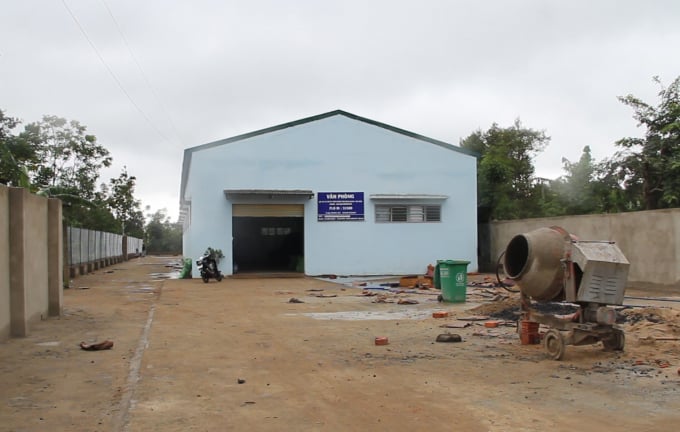May 21, 2025 | 05:02 GMT +7
May 21, 2025 | 05:02 GMT +7
Hotline: 0913.378.918
May 21, 2025 | 05:02 GMT +7
Hotline: 0913.378.918
After 6 years of official implementation in Dak Lak, the VnSAT project has supported dozens of cooperatives, production teams, and farmers to invest in infrastructure and provided them with training courses on science and technology. Local authorities and beneficiaries affirmed the project has created a breakthrough for the province’s coffee industry.
However, many cooperatives and people still have not been able to access VnSAT due to limited funding.
According to Mr. Nguyen Xuan Thu, Chairman of the Board of Directors of Nghia Loc Agricultural Service Cooperative in Ea H'leo District, the unit has participated in the VnSAT project since the early years.
When participating in the project, the cooperative’s members had been trained to apply science and technology in coffee growing. After the courses, their awareness of farming and fertilizing have changed. They understand more about coffee so their products’ quality has been improved. Their income thus has also increased.

The VnSAT project has helped many cooperatives in Dak Lak build and develop a sustainable coffee area. Photo: Quang Yen.
During the time when the cooperative was newly established, it face difficulties due to the lack of facilities and roads to the production area, warehouse, and drying yard... Therefore, in 2016, the unit proposed the VnSAT project to support facilities and infrastructure.
“But its proposal was not approved due to limited funding. This degrades the product quality… In addition, the road to the production area is often flooded or muddy, making it difficult for transporting the products,” said Thu, adding that the situation would be better solved if the VnSAT project allocated more capital for the cooperative.
Thu said it is because newly established cooperatives often lack investment capital particularly for infrastructure so if the VnSAT project helps them with more funds, this will be a springboard for them to develop.
Similarly, Mr. Nguyen Van Sanh, Director of Thanh Binh Agricultural Service Cooperative in Krong Ana District said the VnSAT project supported the unit to invest in a drip irrigation system in 2019. This investment has helped members save much water and irrigation cost.
According to Sanh, along with the drip irrigation system, the cooperative also proposed to build a drying yard, a warehouse, and a concrete road to the production area in 2018. However, the VnSAT project only agreed to support the construction of a 3.5km concrete road with an investment of about VND7 billion.

When farmers improve coffee-growing methods, the yield is superior increasing over that of traditional ones. Photo: Quang Yen.
“The implementation of a road project is slowly due to obstacles occurred in ground clearance works. Specifically, the road is near the houses of some cooperative members who do not agree to donate land for the construction. After many times of convincing by showing them the benefits and convenience of road construction, they finally agree," said Sanh.
However, as the cooperative does not have a drying yard, most of the coffee must be sold fresh. Especially this year, the price of coffee has increased and people want to dry them before sales but there is no place for that. This leads to some effects on their income. The cooperative now recommends getting more support to invest in building drying yards and warehouses.
Another unit, the Quynh Tan Trading and Service Cooperative in Krong Ana District has been supported by the VnSAT project to invest in two sprinkler irrigation systems in 2019 and 2020.

Many cooperatives and production groups proposed the VnSAT project to support investments in building warehouses and drying yards to improve coffee quality. Photo: Quang Yen.
According to Mr. Nguyen Viet Tot, Director of Quynh Tan Service and Trade Cooperative, the VnSAT project has committed to cover 50% of the investment capital, the rest should come from local farmers. Along with an irrigation system, the cooperative also proposed to build a road, drying yards, and warehouses. The VnSAT only approved to build of nearly 4km of concrete road to the production area.
“The cooperative has recommended getting some processing machines for fresh coffee, but the project did not agree... If the VnSAT project gets larger capital sources, the cooperatives will have more chances to access them, thereby they can boost the operation more effectively by investing in machinery and equipment," said Tot.
A representative from the VnSAT Dak Lak project said in 2021, the unit had invested in 9 infrastructure projects for cooperatives. However, due to the impact of the Covid-19 pandemic, particularly on some localities, it was very difficult for contractors to gather materials, machinery as well as mobilize workers to continue the construction.
Moreover, some provincial investment sub-projects, after completing the procedures for implementation, hit the rainy season, so the first stage encountered many difficulties.
Currently, the dry season is coming, so the project is progressing. As it is planned, 9 sub-projects of the VnSAT Dak Lak project will reach the finish line by June 30, 2022, so that it can be handed over to the locality for operation. This will help improve the efficiency of the coffee area meeting the project's target.
Translated by Linh Nguyen

(VAN) Japan's grant aid project contributes to capacity building, promoting organic agricultural production, and fostering sustainable community development in Dong Thap province.

(VAN) For years, the CRISPR-Cas9 genome technology has been reshaping genetic engineering, a precision tool to transform everything from agriculture to medicine.

(VAN) Vietnam aims to become a 'leader' in the region in the capacity and managing effectively soil health and crop nutrition.
![Reducing emissions from rice fields: [Part 1] Farming clean rice together](https://t.ex-cdn.com/nongnghiepmoitruong.vn/608w/files/news/2025/05/05/z6509661417740_a647202949c539012a959e841c03e1d3-nongnghiep-143611.jpg)
(VAN) Growing clean rice helps reduce environmental pollution while increasing income, allowing farmers to feel secure in production and remain committed to their fields for the long term.
/2025/05/19/5136-1-144800_230.jpg)
(VAN) The Nghe An Provincial People's Committee has just approved the list of beneficiaries eligible for revenue from the Emission Reductions Payment Agreement (ERPA) in the North Central region for the year 2025.

(VAN) 14 out of 35 domesticated elephants in Dak Lak province have had their living conditions improved, with 11 of them currently participating in the non-riding elephant tourism model.

(VAN) Muong Nhe Nature Reserve hopes that being upgraded to a national park will lay the foundation for forest protection efforts to be carried out in a systematic, modern, and sustainable manner.